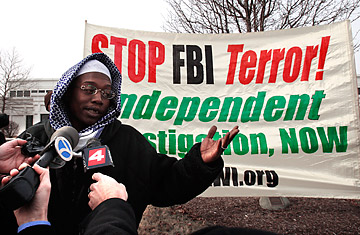
Jamil Carswell, son of imam Luqman Ameen Abdullah, talks to the media outside the Dearborn, Mich., police station on Monday, Feb. 1, 2010
Correction Appended: Feb. 2, 2010
Umar Farouk Abdulmutallab is a young, educated Nigerian who allegedly tried to blow up Delta Flight 253 bound for Detroit on Christmas Day. Imam Luqman Ameen Abdullah, shot to death in nearby Dearborn, Mich., by FBI agents last Oct. 28, was an African-American felon with an apparent penchant for stolen goods and a far-fetched wish to establish a Shari'a state on American soil. The two had nothing in common other than being Muslims. And yet with the release Monday, Feb. 1, of Abdullah's autopsy, their cases continue to haunt one of metropolitan Detroit's few successful communities. The immigrants who have made this America's largest Muslim community now fear they may face the scrutiny they endured for years post-9/11.
The autopsy, released by Wayne County medical examiner Carl Schmidt, showed that Abdullah was shot a total of 20 times, incurring 21 wounds. He had died during a raid by federal law-enforcement agents on a warehouse in Dearborn, a 20-minute drive southwest of downtown Detroit. And while federal authorities had claimed after the raid that Abdullah opened fire after refusing to surrender his weapon, Schmidt said Monday that when medical-examiner-office investigators found Abdullah's body inside a semitrailer, the imam's hands were cuffed behind his back. "I don't recall police being involved in a case that's had as many gunshot wounds," he said.
Ronald Haddad, the police chief of Dearborn, is leading an investigation that could result in charges of excessive force or even murder against FBI agents. Either Kym Worthy, Wayne County's top prosecutor, or Michigan attorney general Mike Cox will ultimately determine whether to file charges. Department of Justice officials are also reviewing the case. "This is a very unique case," says Haddad. "Our mission right now is to ensure a fair, objective, honest evaluation of what took place."
That will be tough. Abdullah's entire history is mysterious. Also known as Christopher Thomas, Abdullah established a criminal record in the late 1970s, when he was charged with resisting arrest and assaulting a Mobile, Ala., police officer. In 1981 he was convicted in Wayne County of felony assault and carrying a concealed weapon.
At some point he embraced Islam and became the local leader of a Muslim sect known as the Ummah. In court documents, federal authorities describe the Ummah as a "nationwide radical fundamentalist Sunni group consisting mainly of African Americans" who converted from Christianity while serving prison sentences. The Ummah's national leader is Jamil Abdullah al-Amin, a militant civil rights–era figure once known as H. Rap Brown. In 2001, al-Amin was convicted of fatally shooting two Georgia police officers; he remains in a federal prison.
Federal authorities began monitoring Detroit's Ummah in 2007, using informants inside the group's main mosque. In court documents, authorities portray Abdullah, 53, as a mesmerizing figure whose sermons frequently included anti-U.S.-government rhetoric. He allegedly called his flock to wage a violent "offensive jihad" rather than a "defensive jihad" and taught that "every Muslim should have a weapon and not be afraid to use their weapon when needed." In January 2009, when Detroit officials evicted the Ummah from its mosque for failure to pay property taxes, police found firearms, knives and martial-arts weapons inside Abdullah's apartment, which was apparently inside the mosque. Authorities say the group participated in an extensive theft ring: in February 2009, for instance, Abdullah allegedly went to Chicago to obtain fur coats he believed were stolen, then brought them to Michigan. Abdullah's son Mujahid Carswell later tried to sell fur coats and laptops he believed were stolen, according to court documents. (He has been charged with committing, aiding or abetting others in the sale or receipt of stolen goods transported between states.) Eleven of Abdullah's followers have been arrested on an assortment of charges, including possession of firearms by a convicted felon, mail fraud and conspiring to receive and sell stolen goods. And their leader, of course, has been killed.
Since the Abdullah case, there has been a quiet debate in the broader Islamic community about whether the Ummah can be considered authentically Muslim. Says Ibrahim Aljahim, a Yemeni-American leader: "Islam is a peaceful religion, while these terrorists are nonbelievers and hypocrites." Nevertheless, the cases of Adbullah and Abdulmutallab have prompted protests from a community fearful of undeserved scrutiny. Abdullah's funeral, at a black mosque in a hardscrabble Detroit neighborhood, drew Muslims of Yemeni and Somali origin. Abdullah is believed to be the first imam to be killed by American law-enforcement authorities — spurring growing concern about law enforcement's use of informants to target mosques with poorly educated people, many of whom are felons with bleak job prospects. "Although Luqman was a black man, he was an imam. If one imam can be killed by law enforcement, any imam can be killed by law enforcement," says Dawud Walid, a local Muslim leader.
Correction: The original version of the story had Wayne County medical examiner Carl Schmidt saying the imam's hands were cuffed behind his back at the time of the shooting. The story clarifies that what Schmidt said was that at the time the imam's body was found, his hands were cuffed.
